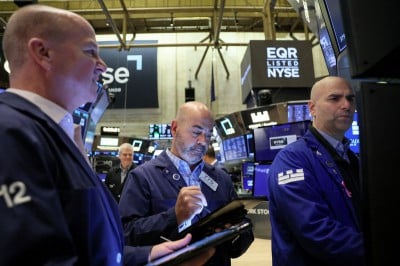Wall Street advances as investors monitor Mideast conflict headlines
 © Reuters. FILE PHOTO: Traders work on the floor of the New York Stock Exchange (NYSE) in New York City, U.S., September 28, 2023. REUTERS/Brendan McDermid AAL -4.08% Add to/Remove from Watchlist Add to Watchlist Add Position
© Reuters. FILE PHOTO: Traders work on the floor of the New York Stock Exchange (NYSE) in New York City, U.S., September 28, 2023. REUTERS/Brendan McDermid AAL -4.08% Add to/Remove from Watchlist Add to Watchlist Add Position Position added successfully to:
+ Add another position Close XAR +4.21% Add to/Remove from Watchlist Add to Watchlist Add Position
Position added successfully to:
+ Add another position Close DAL -4.65% Add to/Remove from Watchlist Add to Watchlist Add Position
Position added successfully to:
+ Add another position Close UAL -4.88% Add to/Remove from Watchlist Add to Watchlist Add Position
Position added successfully to:
+ Add another position Close TSLA -0.33% Add to/Remove from Watchlist Add to Watchlist Add Position
Position added successfully to:
+ Add another position Close RTX +4.60% Add to/Remove from Watchlist Add to Watchlist Add Position
Position added successfully to:
+ Add another position Close LMT +8.93% Add to/Remove from Watchlist Add to Watchlist Add Position
Position added successfully to:
+ Add another position Close GD +8.43% Add to/Remove from Watchlist Add to Watchlist Add Position
Position added successfully to:
+ Add another position Close NOC +11.43% Add to/Remove from Watchlist Add to Watchlist Add Position
Position added successfully to:
+ Add another position Close NVDA -1.08% Add to/Remove from Watchlist Add to Watchlist Add Position
Position added successfully to:
+ Add another position Close AMZN +0.23% Add to/Remove from Watchlist Add to Watchlist Add Position
Position added successfully to:
+ Add another position Close AAPL +0.85% Add to/Remove from Watchlist Add to Watchlist Add Position
Position added successfully to:
+ Add another position Close DOW +1.05% Add to/Remove from Watchlist Add to Watchlist Add Position
Position added successfully to:
+ Add another position Close MSFT +0.78% Add to/Remove from Watchlist Add to Watchlist Add Position
Position added successfully to:
+ Add another position Close
By Sinéad Carew and Shashwat Chauhan
(Reuters) - Wall Street's major indexes closed higher on Monday while energy stocks rallied as investors digested the latest news about the conflict between Israel and the Palestinian Islamist group Hamas.
The Israeli military said it called up reservists and was imposing a total blockade of the Gaza Strip in signs it could be planning a ground assault there to defeat Hamas which launched a deadly attack over the weekend.
But late in the afternoon, a senior Hamas official said the group is open to discussions over a possible truce with Israel. U.S. President Joe Biden said he directed his team to coordinate with regional partners to warn anyone seeking to take advantage of the situation.
News of the conflict sparked an oil rally due to supply concerns. But stock indexes managed to reverse earlier declines with help of more dovish Federal Reserve official comments.
As a result investors appeared to refocus on more U.S. centric matters, John Augustine, said chief investment officer at Huntington National Bank in Columbus, Ohio.
"The stock market and investors are focused on two things, the economy and earnings. The U.S. economy is not slowing and earnings are expected to come out of a recession with reports starting this week," Augustine said.
"Those fundamentals are more powerful in the market than terrible geopolitical headlines from the weekend just as they were more powerful than a strong jobs report and worries about the Fed on Friday."
The U.S. bond market was shut on Monday for Columbus Day, also known as Indigenous Peoples' Day.
A recent surge in U.S. Treasury yields had pressured equities. That pressure eased as gains in the iShares Core 10+ years U.S. bond Exchange Traded Fund (ETF) and the iShares 20+ years Treasury bond ETF suggested that yields could fall on Tuesday.
Meanwhile, Fed officials indicated that recent gains in yields on long-term U.S. Treasury bonds, which directly influence financing costs for households and businesses, could steer the Fed from further hikes in its short-term policy rate. This eased some concerns among equity investors.
The Dow Jones Industrial Average rose 197.07 points, or 0.59%, to 33,604.65. The S&P 500 gained 27.16 points, or 0.63%, at 4,335.66 and the Nasdaq Composite added 52.90 points, or 0.39%, at 13,484.24.
After rising as high as 19.6 during the session, the CBOE volatility index, often referred to as Wall Street's "fear gauge," ended at 17.70.
But traditional safe-haven assets remained in demand, with gold climbing 1.6%, although the U.S. dollar index gave up earlier gains and was down 0.18%.
Rising oil prices boosted the S&P energy sector, which ended up 3.5%, making it the biggest gainer among the S&P 500's 11 major industry sectors.
United Airlines, Delta Air Lines (NYSE:DAL) and American Airlines (NASDAQ:AAL) suspended direct flights to Tel Aviv. Shares of the airlines, also hurt by rising oil prices, ended down more than 4% each. This put pressure on the S&P 500 Passenger Airlines index, which lost 3.7%.
Defense companies had rallied after the news from Israel, with the S&P 500 Aerospace & Defense index ending up 5.6% for its biggest one-day percentage gain since November 2020. Its biggest advancers were Northrop Grumman (NYSE:NOC), which rose 11.4%, and L3Harris Technologies (NYSE:LHX), which added 9.96%.
Exchange-traded funds exposed to Israel were selling off, with iShares MSCI Israel ETF falling 7% while the ARK Israel Innovative Technology ETF fell 5%.
Advancing issues outnumbered declining ones on the NYSE by a 2.19-to-1 ratio; on Nasdaq, a 1.03-to-1 ratio favored decliners.
The S&P 500 posted eight new 52-week highs and 19 new lows; the Nasdaq Composite recorded 37 new highs and 326 new lows.
On U.S. exchanges 8.71 billion shares changed hands compared with the 10.68 billion average for the last 20 sessions.
Wall Street advances as investors monitor Mideast conflict headlines 34

